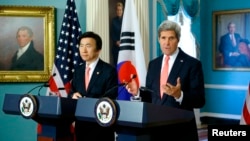U.S. military analysts welcomed the decision by Washington and Seoul to delay the transfer of wartime operational control of combined forces on the Korean peninsula.
The U.S. and South Korea agreed Thursday to delay the transfer of wartime operational control from Washington to Seoul, which was scheduled to take place in December 2015.
The new agreement calls for the transfer of operational control to be “conditions-based approach,” meaning there is no specific deadline for the handover, according to the Joint Communique issued after the 46th ROK-U.S. Security Consultative Meeting.
James Thurman, a retired Army general who served as the commander of combined forces on the Korean peninsula from July 2011 to October 2013, said it was “a very good decision.”
“Given the volatility [on the Korean peninsula], it was not a good time to dissolve Combined Forces Command,” explained Thurman in a telephone interview Friday with VOA.
“Anytime you put a timeline out there, the conditions change and the most important thing the alliance does is that it keeps the peninsula stable and peaceful,” the general said.
General B.B. Bell, who served as the commander of the combined forces from 2006 until his retirement in 2008, told VOA that the postponement is “exactly the right decision given the nature of the [North Korean] threat.”
“This is a significant change from a specific date that does not involve North Korea to a conditions-based approach on South Korea’s readiness to deter and defend itself from North Korean provocations; and also condition of change in Northeast Asia security environment,” the Army veteran elaborated.
Dr. Michael O’Hanlon, a senior fellow at the Brookings Institution agreed. “I am very glad that there is no new date by which we are supposed to complete the transfer,” wrote O’Hanlon in an e-mail message sent to VOA. O’Hanlon said the postponement of the dissolution of the combined forces is the right move considering threats posed by Pyongyang.
Senior U.S. military officials cited North Korean threats, including Pyongyang’s enhancing nuclear and missile capability, as a main reason for the delay.
“In violation of United Nations Security Council resolutions, North Korea carried out its third nuclear test last year and significantly increased the frequency of no-notice ballistic missile launches this year,” Curtis Scaparrotti, Commander of U.S. Forces Korea, told reporters Friday.
As for the possible overreaction by the North on the latest move by the two allies, analysts say such response from the communist country is nothing new, adding the U.S. and South Korean militaries are well aware of that possibility.
“They have already overreacted with [the sinking of the South Korean naval corvette] Cheonan in 2010 and [the bombardment of South Korean island] Yeonyeong in the same year,” explained Bell. “There can’t be any more overreaction than that.”











